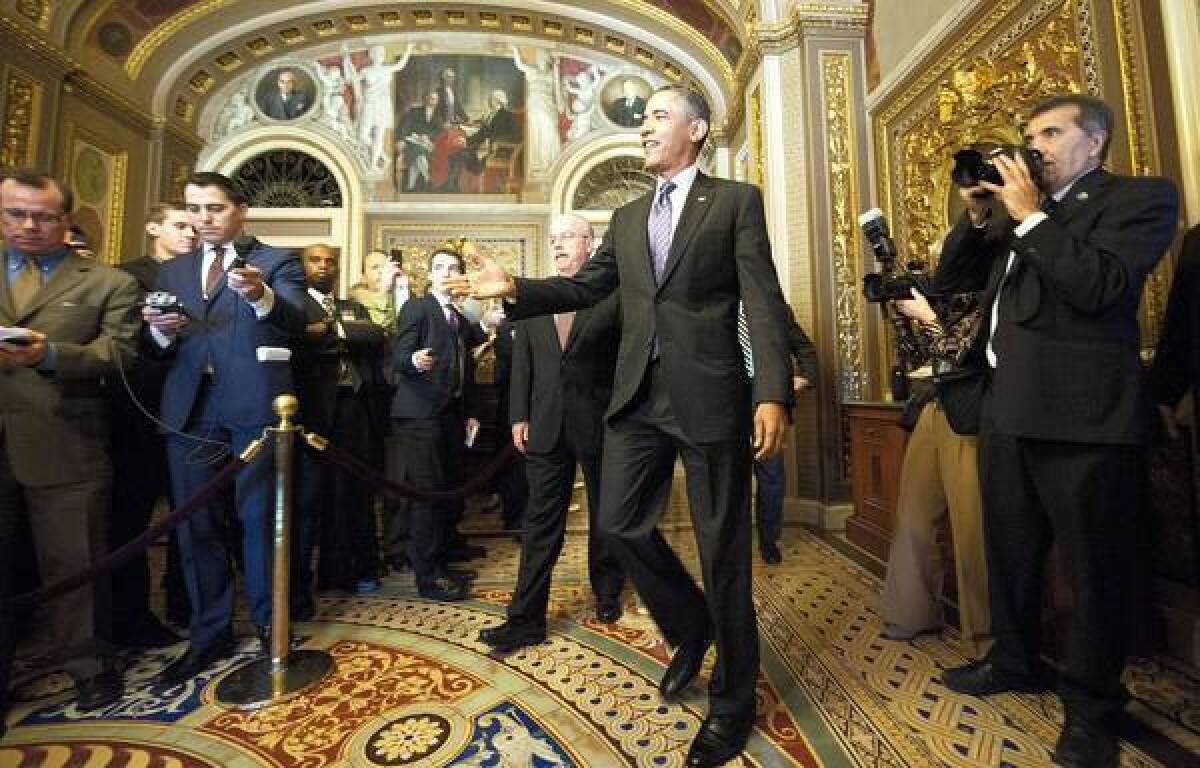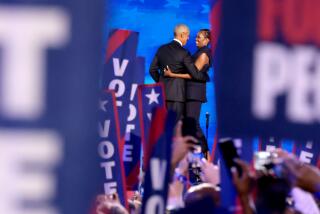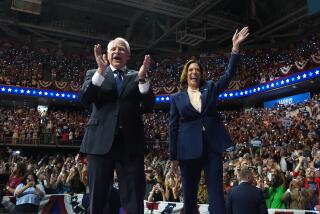Obama turns on the charm for Republicans, but not all of them

WASHINGTON — As President Obama made the rounds on Capitol Hill this week for his so-called charm offensive, one question dogged him as he met with Republicans: Is this a sincere attempt to build bridges or merely for show?
The answer, it seems, is: It depends on which Republicans.
As White House aides push ahead with the president’s legislative agenda, they have zeroed in on the Senate GOP as the most receptive — if somewhat coy — target for courtship. Some in that chamber have shown openness to compromise on immigration reform and gun control, and even a willingness to entertain the president’s demand for new tax revenue as part of any deficit reduction deal.
House Republicans haven’t budged from their no-more-taxes stance.
So Obama has taken clearly different approaches: trying to charm one side of the Capitol and placate the other.
Administration officials say the president’s goal is to prime the Senate for a deficit deal. The only way legislation will move is if a bipartisan group pushes it through the Senate and pressures House Speaker John A. Boehner (R-Ohio) to bring it up, perhaps allowing it to pass with Democrats’ help, said one administration official, who like other White House aides asked not to be identified when discussing strategy.
So it was Republican senators whom Obama dialed up last week, wining and dining a dozen potential budget allies at a luxurious hotel. He followed up Thursday by attending a lobster salad luncheon at the Capitol with Republican senators. The president lingered, letting every senator get a question.
“I feel the same way about this as I felt about the dinner,” said Sen. Mike Johanns (R-Neb.), who attended both. “I think it’s positive on his part. I think it clears the air.”
House Republicans didn’t quite get the full treatment.
Rep. Paul D. Ryan (R-Wis.) was invited to lunch at the White House last week, but a Democratic chaperon, Rep. Chris Van Hollen of Maryland, came too. The rest of Ryan’s colleagues got the courtesy call, a presidential visit to their weekly all-member meeting at the Capitol.
Both sides said that visit came off as more staged than candid. Republicans preselected the topics and lawmakers who would ask questions. Obama gave standard answers. Some lawmakers described the president as dismissive of the House GOP’s top fiscal goal: to balance the budget in 10 years.
As the meeting coincided with the announcement of the new pope, Rep. Dana Rohrabacher (R-Huntington Beach) tweeted: “What a coincidence, as smoke rose above the Vatican Prez Obama was on Capitol Hill blowing smoke in our face.”
It is not surprising that many in Washington question the motive behind the president’s new strategy. Obama spent much of his reelection campaign blasting congressional Republicans.
His attempt to cozy up to lawmakers comes after years of dismissing the effectiveness of public or private displays of goodwill. Earlier this year, his top spokesman mocked suggestions that a president would go to Capitol Hill for such meetings as the stuff of prime-time drama. “‘I think that’s in a television program,” spokesman Jay Carney said. When journalists appeared confused, he suggested, “The West Wing”?
But slumping approval ratings and dead-end deficit talks, apparently, can make television dramas come to life. Obama failed in his attempts to use his bully pulpit to block $85 billion in automatic budget cuts this year. With the so-called sequester in effect for two weeks, Obama is facing the worst possible outcomes — the cuts have resulted in little public outcry, and he is taking heat for the dysfunction in Washington.
A Washington Post poll this week found people no longer gave Obama an overwhelming edge over congressional Republicans on the question of whom they trust to handle the economy. Meanwhile, the president’s approval rate has dropped to around 50%, a slouch from his post-election bump to 57% in a Gallup survey.
Amid these pressures, the White House’s new approach looked to some like a showy gesture intended to silence critics who have long accused him of being dismissive of lawmakers and their views.
Administration officials argued it was more than that, saying the president wants to reestablish trust and improve communication. One official noted with frustration that some Republicans and pundits seemed unaware of the president’s latest deficit offer and too quickly fell back on well-worn excuses for not negotiating.
“Most Republican members of Congress and pundits don’t even know what the president’s plan is,” the official said.
Republicans let the president know it wasn’t just his budget plan that irked them, but his delivery. Lawmakers complained that he seemed more focused on defeating them than on reaching a deal.
Obama didn’t help his cause by speaking at an event Wednesday for his reincarnated campaign — known as Organizing for Action — which is dedicated to supporting his agenda and pressuring lawmakers who don’t.
But Sen. Jeff Flake (R-Ariz.) said Obama reassured GOP senators that “he’s done running.”
“And so his concern is governing. And growing the economy,” Flake said. “And in order to do those things, let’s face it, he’s going to need our help and we’re going to need him.”
House Republicans remained skeptical, however. Obama’s public posture in the run-up to the deadline for the March 1 budget cuts reaffirmed the view that he would continue to campaign against the GOP, with his ultimate goal being to end his term as he started it — with a Democratic-led House.
“I’m going to wait for the actions,” said Rep. Michael Grimm (R-N.Y.), a Republican from a district Obama carried. “If the president is sincere and he really wants to work with us, that will show itself over the next several months.”
Obama’s road to a deal doesn’t only go through Republicans. The president will need support from his Democratic allies, who weren’t shy about expressing their nervousness that the president was so eager to strike a bargain that he would agree to changes in entitlement programs they couldn’t stomach.
At a meeting with House Democrats on Wednesday, lawmakers burst into applause when Rep. Keith Ellison of Minnesota, co-chairman of the Congressional Progressive Caucus, questioned the president about changing the way Social Security benefits are adjusted for inflation — a proposal the president has said he could agree to.
“He got the message,” said Rep. Jackie Speier of Hillsborough.
Obama repeated his position that he would only consider the inflation adjustment as part of a broad agreement with Republicans.
A budget agreement seems as far off as it was last week. The White House vowed the president would keep up his engagement with lawmakers, but revealed no new phone calls or planned outings.
At least one congressional veteran kept expectations low. “I hope it does good, but it’s certainly not going to do any harm,” said Senate Majority Leader Harry Reid (D-Nev.).
kathleen.hennessey@latimes.com
Michael A. Memoli in the Washington bureau contributed to this report.
More to Read
Sign up for Essential California
The most important California stories and recommendations in your inbox every morning.
You may occasionally receive promotional content from the Los Angeles Times.












